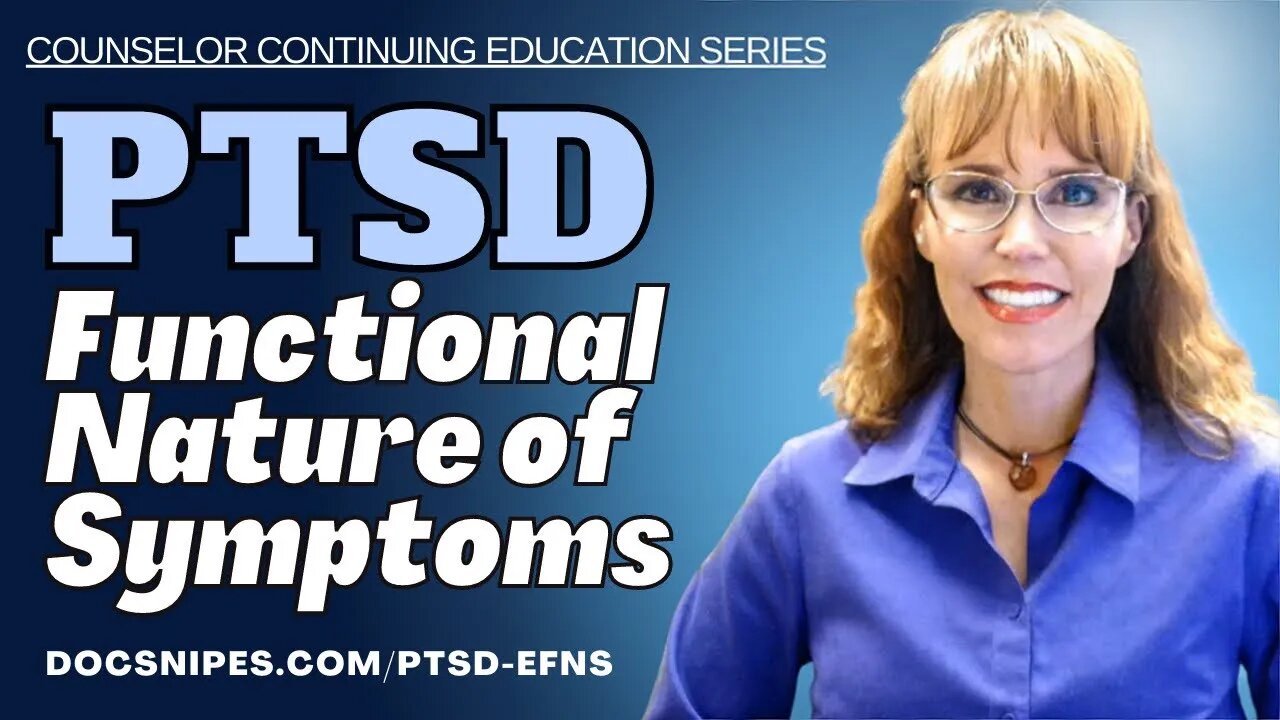Premium Only Content

PTSD Exploring the Function of Symptoms | CBT Counselor Continuing Education
Dr. Dawn-Elise Snipes is a Licensed Professional Counselor and Qualified Clinical Supervisor. She received her PhD in Mental Health Counseling from the University of Florida in 2002. In addition to being a practicing clinician, she has provided training to counselors, social workers, nurses and case managers internationally since 2006 through AllCEUs.com
📢SUBSCRIBE and click the BELL to get notified when new videos are uploaded.
If this video has helped you, please consider donating to support the channel Cashapp: 💲DocSnipes Paypal: https://DocSnipes.com/Donate YouTube: DocSnipes.com/Join
💻 Online course based on this video can be found at
https://AllCEUs.com Unlimited continuing education CEUs $59
⭐ Specialty Certificate Programs and Masterclasses in Case Management and Counselor Certification beginning at $89 https://AllCEUs.com/certificate-tracks
#PTSD #symptoms #cbt #counseling #counselling
NOTE: ALL VIDEOS are for educational purposes only and are NOT a replacement for medical advice or counseling from a licensed professional.
The symptoms of PTSD can be seen as adaptive responses to a traumatic event, serving a functional purpose in the context of the individual's experience. These symptoms can be understood as attempts by the mind and body to protect and cope with the aftermath of trauma.
One of the core symptoms of PTSD is intrusive thoughts or flashbacks, where the individual re-experiences the traumatic event. While distressing, these intrusive thoughts can serve a functional purpose by allowing the individual to process and make sense of the traumatic experience. By replaying the event in their minds, individuals may try to find meaning, understand what happened, and integrate the experience into their memory.
Avoidance symptoms, such as avoiding reminders of the trauma or emotional numbing, can also be viewed as functional responses. They serve to protect the individual from re-triggering overwhelming emotions and sensations associated with the traumatic event. By avoiding reminders or numbing emotions, individuals may temporarily create a sense of safety and emotional distance from the traumatic memories.
Hyperarousal symptoms, such as hypervigilance, irritability, and difficulty sleeping, can be seen as adaptive responses to perceived threats or dangers. These symptoms reflect an enhanced state of alertness and readiness for potential harm. While it may cause distress and interfere with daily functioning, hyperarousal symptoms can be viewed as the mind and body's way of preparing for potential threats and ensuring survival.
Video by Dr. Dawn Elise Snipes on integrative behavioral health approaches including counseling techniques and skills for improving mental health and reducing mental illness.
AllCEUs.com provides multimedia counselor education and CEUs for LPCs, LMHCs, LMFTs and LCSWs as well as addiction counselor precertification training and continuing education on many of the videos on this channel. Unlike other providers like CE4Less, AllCEUs includes a weekly LIVE Stream Webinar with your unlimited continuing education and professional development membership.
-
 8:52
8:52
DocSnipes
1 year agoHow Cognitive Distortions Contribute to Violence
254 -
 1:21:54
1:21:54
JULIE GREEN MINISTRIES
3 hours agoEXPOSING AND BRINGING DOWN WHO REALLY CONTROLS THE ESTABLISHMENT IN DC
99.4K108 -

Chicks On The Right
3 hours agoHunter Biden is probably running for office, the Fireaid scam, and we need to talk about J Lo.
21.3K3 -
 LIVE
LIVE
AP4Liberty
11 hours ago $0.62 earnedOrgan Harvest Horror: When Bureaucracy Trumps Biology
291 watching -
 1:22:08
1:22:08
Game On!
16 hours ago $3.04 earnedDonald Trump DEMANDS Washington Football Team Change Their Name Back To Redskins!
37.5K2 -
 LIVE
LIVE
The Bubba Army
23 hours agoHunter Biden UNHINGED! - Bubba the Love Sponge® Show | 7/22/25
1,982 watching -
 30:30
30:30
World2Briggs
15 hours ago $3.52 earnedTop 30 Cities EVERYONE is MOVING TO in America in 2025
41.5K15 -
 2:00:37
2:00:37
Lara Logan
3 days agoINFORMATION WARFARE: Filmmaker Mike Smith on Media Propaganda & Hollywood’s Dark Agenda | Episode 27
28.1K25 -
 2:01:19
2:01:19
BEK TV
1 day agoTrent Loos in the Morning 7/22/2025
24K -
 9:06
9:06
MattMorseTV
18 hours ago $2.06 earnedTrump wants to END THE FED.
21.9K23